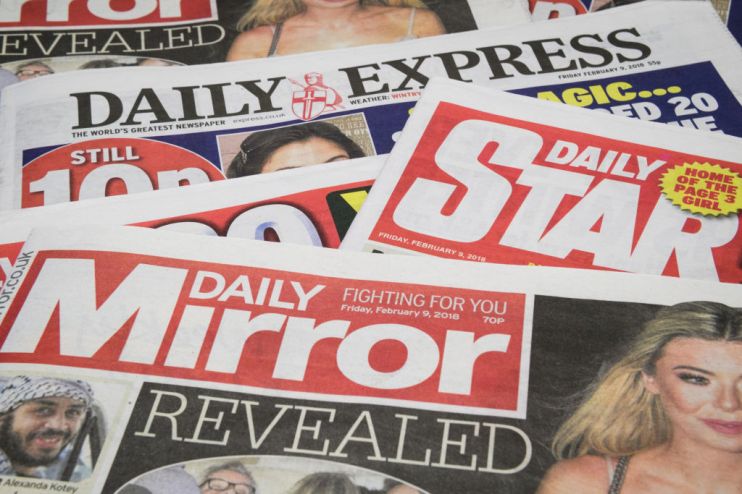Mirror publisher Reach looks to data as it fights back against tech giants

Reach, the owner of the Daily Mirror and Daily Express, today unveiled plans to win back customer data from tech giants such as Google and Facebook as the publisher looks to expand its user base and counteract a decline in revenue.
The figures
Like-for-like revenue hit £702.5m, down 5.3 per cent from £723.9m a year before. Reach said circulation revenue was “resilient” while digital sales rose 13.2 per cent as average monthly page views jumped 25 per cent year on year.
And the publisher swung back into the black with a profit before tax of £120.9m, up from 2018’s £119.9m loss.
Earnings per share also rose to 31.8p after investors suffered a loss of 41p per share a year ago.
Reach’s dividend edged up too, from 6.14p per share in 2018 to 6.55p per share in 2019.
Why it’s interesting
Reach, which is the UK’s largest commercial national and regional publisher, today delivered its first set of results featuring a full-year of trading for its Express and Star titles, which it acquired for £200m in 2018.
Like other publishers, Reach has been battling a slowdown in print circulation and print advertising, and has looked to double down on its more lucrative digital business.
The figures marked a strong year of trading for Reach’s online output, with average monthly page views surging by a quarter to hit 1.3bn, and digital revenue up more than 13 per cent.
The company, which also publishes OK magazine, said it had made structural cost savings of £12m, while synergies from its acquisition had saved £16m.
It came as Reach unveiled a radical strategy update to the City this afternoon, with a target of hitting 7m registered customers by the end of 2022, up from fewer than 1m at the end of last year.
The publisher has 47m print and digital unique users in the UK, but only a two per cent sign-up rate. Reach said it would look to increase the number of readers who consented to handing over data such as email addresses.
In exchange, the company will pull together material from across its stable of titles — for example football news and analysis — to provide a wider range of content for the reader.
“That means we increase dwell time and that increases conversion rates,” chief executive Jim Mullen told City A.M. “Because we’re the biggest national and regional news publisher we can attract highly attractive customers for advertisers.”
Mullen said the move came in direct response to new policies from Google and Facebook. Several browsers have announced plans to block third-party cookies — a move that improves user privacy but limits the amount of data sites can use for advertising purposes.
“We have our own platform that users can go on but why don’t we just get those customers to give that data to us [rather than go through Google or Facebook],” the boss said.
“They’re our customers anyway and we have just never asked them. If we see the trust in our brands, for instance the Liverpool Echo, we think there’s a relationship where our readers would trust us [with their data].”
Mullen, who took over as chief executive from Simon Fox in August, said his company will not set up paywalls or ask readers for money — a fundraising model currently employed by the Guardian.
Instead, the publisher will use newsletters to try and draw readers in to more articles across its range of websites.
The announcement sparked turbulent trading for Reach’s shares, which initially rose as much as eight per cent before falling to a four per cent drop. They closed up just under three per cent.
Mullen also told City A.M. that Reach was “comfortable” with how its publications had covered Caroline Flack, the former Love Island presenter who died earlier this month.
“We have a tight governance structure but we’re aware if people are unhappy with some of our coverage they have a right to complain to [press regulator] Ipso,” he said.
Reach last year said it was in early stage talks over a potential takeover of assets from regional publisher JPI Media, but later withdrew from the bidding.
JPI Media, which was formed to buy out Johnston Press, has since said it is no longer exploring a sale of its regional titles, which include the Scotsman and the Yorkshire Post.
However, the private equity-backed firm has agreed the £50m sale of the i newspaper to the owner of the Daily Mail.
What Reach said
Chief executive Jim Mullen said:
I was delighted to join Reach in August 2019 and have been impressed by the relentless focus on producing award-winning journalism and content that shapes national and regional conversations. These are strong foundations on which to invest and innovate to ensure a sustainable future for our trusted brands.
2019 was a year of good operational and solid financial progress with record growth in audience numbers, consistently good cash generation and a strong balance sheet. This, along with unparalleled scale, underpins our drive to build an intelligent, relevant and trusted content business for the long term whilst continuing to deliver for our stakeholders.
Content is at the heart of the new customer value strategy we are announcing today. We have an unmatched reach in UK media and will deepen our relationships via increased customer engagement. Through this, we see significant potential to accelerate the diversification of our digital revenue and capture more value to deliver on our sustainable digital growth ambitions.
Main image credit: Getty